Cancer Whole-Exome Sequencing
Identifying Coding Mutations in Cancer
Sequencing the cancer exome provides useful information about the coding mutations that contribute to tumor progression. Because the exome represents less than 2% of the genome, cancer exome sequencing using next-generation sequencing (NGS) technology is a cost-effective alternative to whole-genome sequencing. Exome sequencing also produces a more manageable data set compared to whole-genome approaches.
Streamlined Tumor Exome Sequencing
This comprehensive workflow offers rapid, accurate variant analysis for FFPE tumor samples of varying quality and input amount.
Advantages of Cancer Exome Sequencing
Exome sequencing allows cancer researchers to assess only coding regions, which frequently contain mutations that affect tumor progression. Depending on experimental needs, the content for cancer exome sequencing can also be expanded to untranslated regions and microRNA (miRNA) binding sites. Because it offers an accessible combination of turnaround time and price, exome sequencing is the method of choice for many tumor-normal comparisons.
Learn More About Exome SequencingLibrary Preparation and Exome Enrichment
Library preparation and exome enrichment are critical to the success of any exome sequencing experiment. For cancer whole-exome sequencing, the ability to enrich limited DNA samples is especially important. Targeted exome enrichment methods that uniformly and specifically enrich content enable reliable identification of coding variants.
Learn More About Target EnrichmentFeatured Cancer Exome Sequencing Research
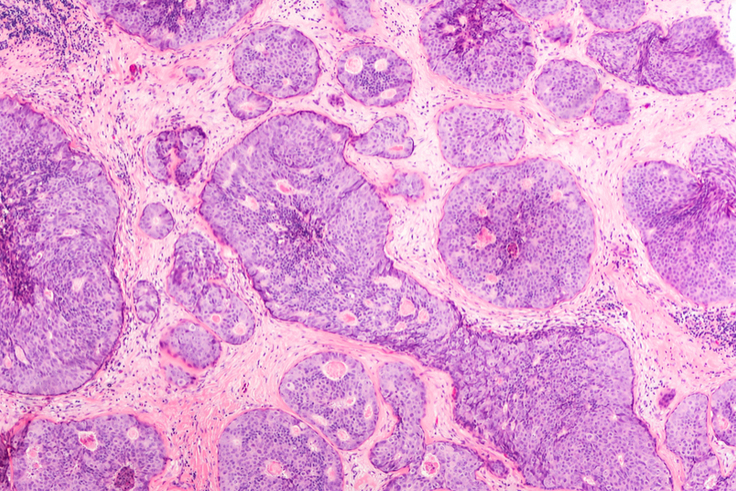
NGS Proves Invaluable for Biomarker Discovery
Cancer researchers use exome, RNA, and chromatin immunoprecipitation sequencing methods in their search for tumor-associated gene expression profiles.
Read Article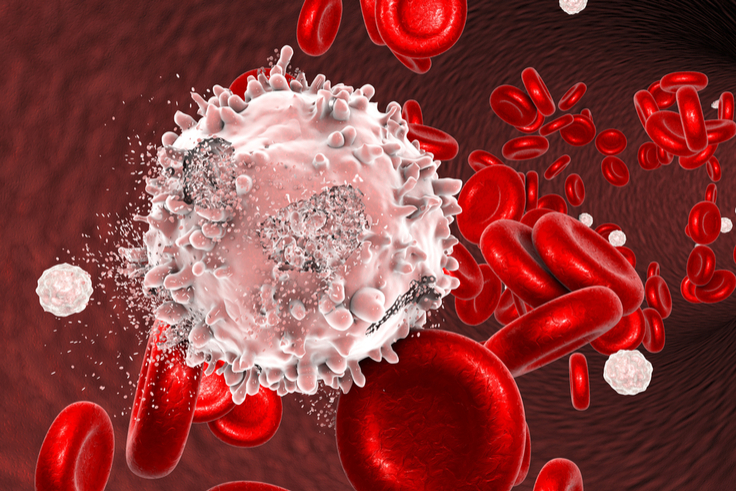
Capturing Variant Data from Blood
Cancer researchers use whole-exome, whole-genome, and transcriptome sequencing of exosomal DNA and RNA from pancreatic cancer samples to gain insight into the potential of liquid biopsies.
Read Article
Exploring the Genetic Basis of Oral Cancer
Researchers use a variety of methods, including whole-exome sequencing, to study a deadly oral cancer. They have identified somatic variants and other genomic alterations that may influence the course of the disease.
Read ArticleCancer Whole-Exome Sequencing Workflow
Illumina offers several library preparation, sequencing, and data analysis options for sequencing cancer exomes. Streamlined library prep workflows and flexible kit configurations accommodate multiple study designs. Illumina systems deliver industry-leading data quality—in fact, approximately 90% of the world’s sequencing data are generated using Illumina sequencing by synthesis (SBS) chemistry.
User-friendly tools simplify cancer exome data analysis and interpretation, so you can spend less time analyzing data and more time focusing on your next breakthrough.
Click on the below to view products for each workflow step.
This fast, user-friendly workflow combines on-bead tagmentation chemistry with a simplified single hybridization protocol to reduce total workflow time.
This exome sequencing library preparation solution uses a simple workflow to provide a fast path to greater understanding of the human exome.
Groundbreaking benchtop sequencers allow you to explore new discoveries across a variety of current and emerging applications, with higher efficiency and fewer restraints.
Scalable throughput and flexibility for virtually any genome, sequencing method, and scale of project.
The Illumina DRAGEN (Dynamic Read Analysis for GENomics) Bio-IT Platform provides ultra-rapid secondary analysis of exome and other NGS data.
DRAGEN Enrichment AppAligns sequences to the reference genome, producing alignment files and quality control and analysis metrics for exomes.
DRAGEN Somatic AppPerforms somatic variant detection on exome sequencing data from tumor samples. Includes tumor-only and tumor-normal modes.
BaseSpace Sequence HubThe Illumina genomics computing environment for NGS data analysis and management.
Uses the BWA Genome Alignment Software and GATK Variant Caller for exome data analysis.
Isaac Enrichment AppUses the Isaac Genome Alignment Software and Isaac Variant Caller for exome data analysis.
BaseSpace Variant InterpreterLeverages leading annotation databases and a powerful filtering interface for rapid identification of disease-associated variants.
Comprehensive Genomic Profiling (CGP)
This next-generation sequencing approach consolidates hundreds of cancer-related biomarkers, including different variant types, into a single assay. Find out how it works, explore the benefits, and see how it compares to other common methods.
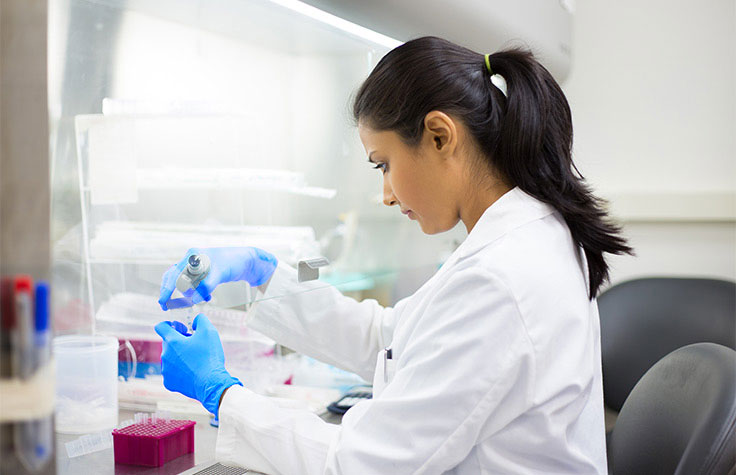
Learn More
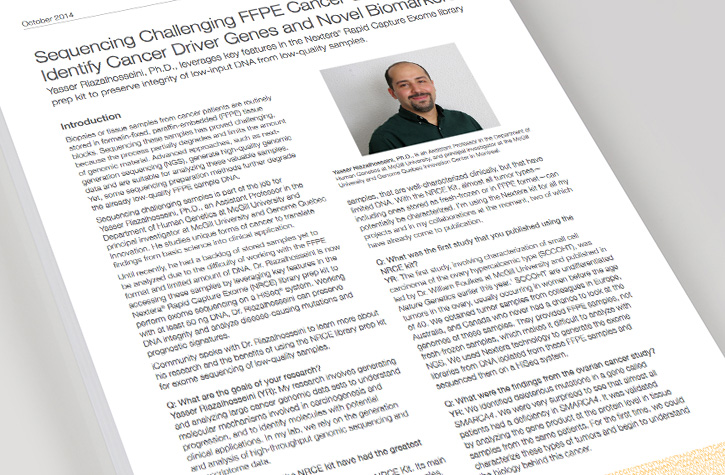
Sequencing Challenging FFPE Cancer Samples
Dr. Yasser Riazalhosseini uses exome sequencing to identify cancer driver genes and novel biomarkers.
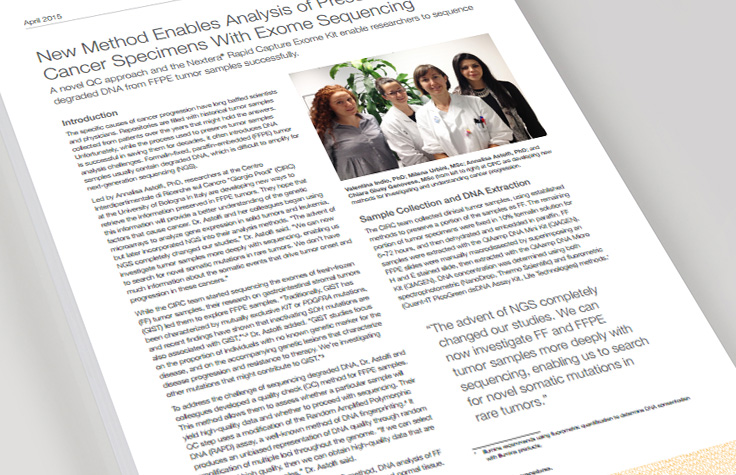
QC Method Enables Cancer Exome Sequencing
Researchers in Italy developed a quality control method for formalin-fixed, paraffin-embedded tissues.